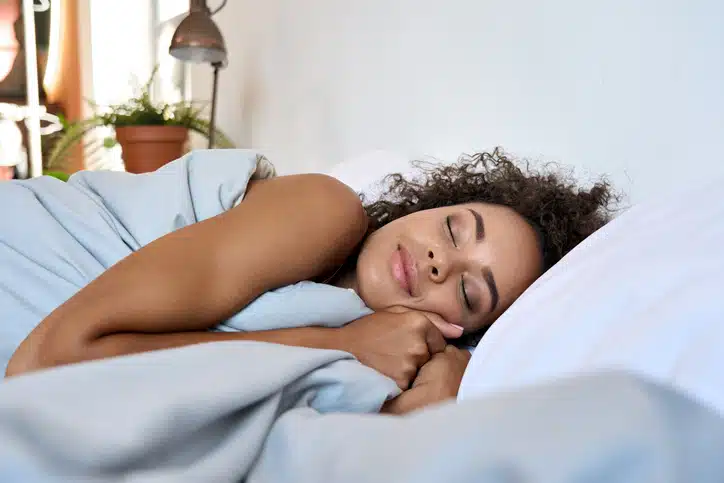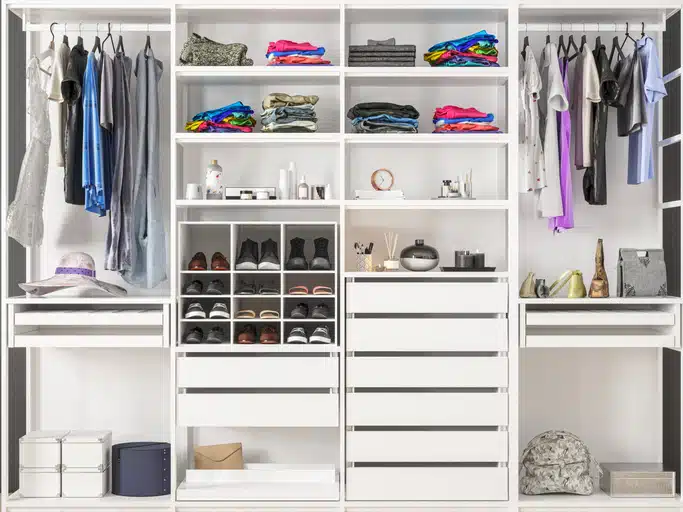What affects our ability to sleep?
We all know the stressful feeling of stepping into a cluttered room to see scattered belongings and mess. You can attempt to ignore clutter but it can send your stress levels rising as it reminds you of chores we need to do to keep the house in order.
Whilst stress at any time of day is not recommended, did you know that a messy, cluttered bedroom can significantly impact your sleep quality? We wanted to delve into the science behind it all and explore how tidying up can lead to better rest.
Increased levels of cortisol
Research has shown that a messy bedroom raises cortisol levels. Cortisol, often referred to as the “stress hormone,” plays a crucial role in our body’s response to stress. When you feel stressed, your cortisol levels rise, making it harder to fall asleep. This ties into the stress linked to seeing mess and being reminded of cleaning and decluttering tasks you haven’t managed to get done that day. This then sets your mind and heart racing, making it much harder to drift off.
An overactive mind
Even when lying in bed with your eyes closed, your subconscious mind can still be at play and prevent you from fully falling asleep. Have you ever lay awake in bed thinking about your unfinished to-do list? This could be affecting your sleep. A cluttered environment contributes to an underlying feeling of stress that can weigh on your mind, whether you’re awake or asleep. Even if you’re not consciously aware of it, clutter disrupts your ability to enjoy deep, restorative sleep.
To find out more about the impact of mess and clutter on sleep, we spoke to an expert:
Superintendent Pharmacist, Carolina Goncalves, from Pharmica.co.uk answered the following queries:
What is the impact of a cluttered bedroom?
“Clutter can affect the quality of sleep an individual gets through a number of psychological mechanisms. Research shows a cluttered bedroom can distract individuals when they are attempting to sleep by prompting thoughts of cleaning the clutter. The resulting feelings of anxiety may delay the onset of sleep by making it challenging to relax and clear the mind. This is because the brain perceives clutter as an unfinished task, triggering stress responses that inhibit relaxation, essential for transitioning into sleep.
“Depending on the size of the bedroom, clutter may also affect ventilation and temperature control. For instance, a large amount of clutter near the windows can prevent adequate airflow, even if the windows are open. This restriction can lead to poor air quality and uncomfortable temperatures, which may subsequently reduce sleep quality and shorten the deeper and more restorative stages of sleep. This effect can be exacerbated during a heatwave, especially if humidity levels are high overnight, leading to increased discomfort and restlessness.”
What can people do to combat this?
“The immediate step to take is to organise your bedroom and make the best of the available space. This could be as simple as placing items in storage boxes or bags to stow under the bed so they are out of sight and do not trigger feelings of anxiety that may disrupt sleep. It is also important to avoid hoarding items if possible and to potentially discard or give away any items you may no longer need, which are causing the clutter. This includes books, ornaments and even clothes that may not fit in the wardrobe.
“Once this is done, it can be useful to consider using comfortable bedding and maintaining a clear area that encourages relaxation. Incorporating soothing elements such as soft lighting, calming scents, or white noise can further enhance the bedroom’s ambience and create an environment that is conducive to signalling to the brain that it’s time to wind down.”
What is the perfect environment for sleep?
“Ideally, the bedroom should be between 16°C and 18°C. This temperature range encourages sleep because it aligns with the body’s natural drop in core temperature that signals it is time to wind down and rest. Cooler temperatures help facilitate this decrease, making it easier to fall asleep and stay asleep. The environment should have everything neatly organised with clothes, makeup, books, and any other daily-use items stowed away when it is time to sleep. This includes keeping phones out of arm’s reach when sleeping, as this can reduce the temptation to unlock the phone and expose oneself to blue light, which can suppress the production of the sleep-inducing hormone melatonin, making it harder to fall asleep. Moreover, the environment should be dark and quiet when it is time to sleep to support the body’s natural circadian rhythms and promote uninterrupted sleep.”
Decluttering Tips for Better Sleep
With mess and clutter having such an impact on your sleep quality, there are a few things you can do to create the best environment for rest in your bedroom:
- Clear the surfaces: Start by decluttering surfaces like nightstands, dressers, and shelves. Throw out expired items and things you no longer have use for. Store keepsakes out of sight. Remove unnecessary items and keep only essentials within reach.
- Organise your wardrobes & drawers: A chaotic wardrobe can spill over into your mental and physical space. Sort through your clothes, donate what you no longer need, and organise. Reducing your overconsumption of clothes in the future can lead to easier daily dressing and keep your mind free of smaller decisions to make in the day.
- Limit electronics: You should aim to remove screens from your bedroom or at least never have them on at night. The artificial glow of devices disrupts melatonin production, making it harder to fall asleep.
- Make your bed daily: A neatly made bed sets the tone for the entire room and gives your mood a boost when you get into a tidy bed.
- Create zones: If you have the space, designate specific areas for different activities (e.g., reading, dressing). This helps to keep parts of your life compartmentalised in your mind and leaves space to rest without other things creeping onto your mind. Try to keep any work related items away from your bedroom to establish a separation in your brain from work and home.
- Invest in storage solutions: Use baskets, bins and under-bed storage to keep clutter hidden. If you can invest, you may want to look at built-in wardrobes for space-saving storage.
- Move items into self storage: Nearly one third of households in the UK with a self storage unit use it to create more space at home. Consider renting a small self storage unit to keep your house clutter free.
Remember, a clutter-free bedroom isn’t just about aesthetics; it directly impacts your sleep quality. So, take a few minutes each day to tidy up, and watch how your restful nights improve.
If you need self storage Tamworth, Hinckley or Nuneaton we provide state-of-the-art storage facilities for home storage and business storage. We make storage as simple, easy and hassle free as possible. You can click here to find out more or go online and get a quote in 30 seconds!


